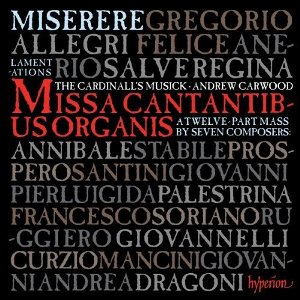Recording of the month: Anamorfosi
Anamorfosi
Allegri Monteverdi
Le Poème Harmonique / Vincent Dumestre
Alpha 438
In Kafka’s Metamorphosis Gregor Samsa may have woke up one morning to find that he had been transformed overnight into a giant insect, but in the story of music history there are few such hard-borders. In fact, it’s pretty much one long slide from beginning to end. On the way there are famous moments, nodes that define a style, but even between seemingly opposed categories there is often a veritable riot of frictionless trade. This is a programme which delves deep into the slippage between sacred and secular through a host of exquisite works appropriated and transformed for counter-reformation interests. The title, Anamorfosi (Anamorphosis) is drawn from the visual arts, a deliberate distortion that requires the viewer to occupy a particular perspective or vantage point. In short, this is one of the best programmes that I have encountered in recent years both in concept and execution and it begins with an icon of early music, Allegri’s Miserere.
[...]
This superb Miserere performance sits alongside lesser-known and rather ingenious contrafacta. These are works which were originally secular—madrigals and dramatic recitatives—pieces which, in short had already become famous in their original contexts before being transformed by swapping in a sacred text as the church harnessed the power of the very music of actors and theatres that it sought to suppress. An arresting example of this comes from mezzo soprano Eva Zaïcik who gives an absolutely gripping performance of Luigi Rossi’s (1597-1653) Un Allato Messagier, a poetic lament on the death of Christ which was formed by an anonymous author who re-texted Rossi’s ‘Lament of the Queen of Sweden on the Death of her Husband’ (Un ferito cavalier). Of the sacred counterpart I have long admired Suzie Le Blanc and Tragicomedia (Challenge Classics 2001) for their crisp intensity and here, in this sacred re-working, Zaïcik maintains a similarly crisp edge to her mourning but constantly undercuts it with deeper, purpler hues. Much encouraged by the superb instrumentalists this is a performance all enthusiasts of Roman cantatas will find spellbinding. Followed by Monteverdi’s mesmeric (1567-1643) Si dolce è'l martire (a re-texting of Si dolce è'l tormento) with a sparklingly bittersweet performance from soprano Deborah Cachet, the genius of the programme is clear by the third piece.
[...]
To read the full text of this article please visit www.gramophone.co.uk (Nov 2019)
Allegri Monteverdi
Le Poème Harmonique / Vincent Dumestre
Alpha 438
In Kafka’s Metamorphosis Gregor Samsa may have woke up one morning to find that he had been transformed overnight into a giant insect, but in the story of music history there are few such hard-borders. In fact, it’s pretty much one long slide from beginning to end. On the way there are famous moments, nodes that define a style, but even between seemingly opposed categories there is often a veritable riot of frictionless trade. This is a programme which delves deep into the slippage between sacred and secular through a host of exquisite works appropriated and transformed for counter-reformation interests. The title, Anamorfosi (Anamorphosis) is drawn from the visual arts, a deliberate distortion that requires the viewer to occupy a particular perspective or vantage point. In short, this is one of the best programmes that I have encountered in recent years both in concept and execution and it begins with an icon of early music, Allegri’s Miserere.
[...]
This superb Miserere performance sits alongside lesser-known and rather ingenious contrafacta. These are works which were originally secular—madrigals and dramatic recitatives—pieces which, in short had already become famous in their original contexts before being transformed by swapping in a sacred text as the church harnessed the power of the very music of actors and theatres that it sought to suppress. An arresting example of this comes from mezzo soprano Eva Zaïcik who gives an absolutely gripping performance of Luigi Rossi’s (1597-1653) Un Allato Messagier, a poetic lament on the death of Christ which was formed by an anonymous author who re-texted Rossi’s ‘Lament of the Queen of Sweden on the Death of her Husband’ (Un ferito cavalier). Of the sacred counterpart I have long admired Suzie Le Blanc and Tragicomedia (Challenge Classics 2001) for their crisp intensity and here, in this sacred re-working, Zaïcik maintains a similarly crisp edge to her mourning but constantly undercuts it with deeper, purpler hues. Much encouraged by the superb instrumentalists this is a performance all enthusiasts of Roman cantatas will find spellbinding. Followed by Monteverdi’s mesmeric (1567-1643) Si dolce è'l martire (a re-texting of Si dolce è'l tormento) with a sparklingly bittersweet performance from soprano Deborah Cachet, the genius of the programme is clear by the third piece.
[...]
To read the full text of this article please visit www.gramophone.co.uk (Nov 2019)



Comments
Post a Comment